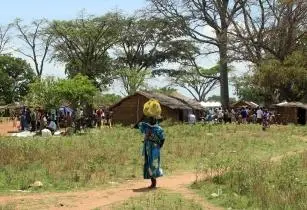As the impacts of climate change continue to intensify, refugees and their host communities are feeling the brunt of these shocks, especially in the refugee hosting districts of Ugandas West Nile region, where deforestation and environmental degradation are hitting hard, causing sudden tension between refugees and the host communities
The unsustainable use of natural resources for shelter and income generation has not only contributed to environmental degradation and increased tension between the refugees and the host communities but has also affected farmers who largely depend on land for their livelihood.
In 2021, UN Women, with funding from the Government of Japan, partnered with the Yumbe district local government to support farmers in the refugee and host communities to improve their farming practices. Through this support, 1,000 farmers in Yumbe and Adjumani districts gained new skills in farming and received higher yielding crop varieties.
“Before this project many of us were used to traditional farming practices without knowing that this leads to poor yields. We used to do seed broadcasting and would start weeding almost after one or sometimes two months. By then the crops would have choked on weeds and competed with the weeds for nutrients which would result in poor yields,” Florence Driciru, a farmer and mother of five living in the host community of Yumbe district's Kochi subcounty explained.
“After the training, I now mostly use line planting and weed my crops two weeks after planting to avoid weeds. I tried out this new farming method and planted the green grams that I received from the district local government. The seed was of good quality and when I applied the methods I learned from the trainings, it led to a good yield,” Dcriciru added.
She belongs to a group of farmers in her community who were jointly supported with trainings in climate smart agriculture, better seed varieties particularly green gram and fruit trees consisting of guavas and mangoes. Thus far, the group has planted 25 acres of guavas and mangoes.
By 2030, food demand is projected to increase by 55% and supporting farmers like Dcriciru not only enables them to be food secure, but guarantees them a source of livelihood since most rural populations in Uganda are dependent on agriculture.





